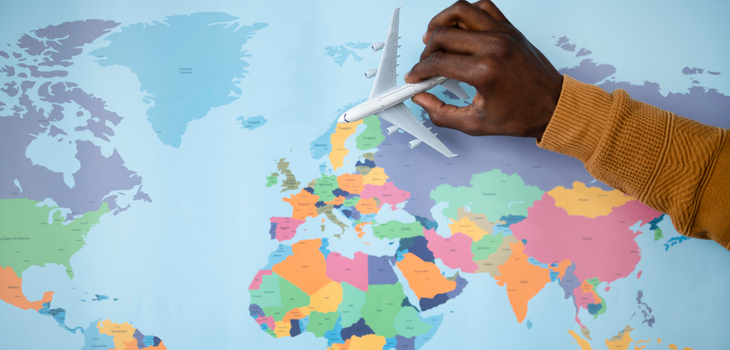Logistics Unveiled: A Comprehensive Guide to Planning Your International Move

Relocation, even within the neighbourhood, is a challenging job. What more of planning an international move, how demanding a task can be, especially if some thought isn't considered? Therefore, it is expedient to have a well-mapped-out plan with all the requirements being considered.
In simple terms, this topic takes you through planning, carrying out and having complete control of how to effectively coordinate your international move and everything you need to know about moving. It will help to guide you through step-by-step instructions for individuals and families planning to relocate abroad. This guide contains practical information on what to know, things to do and not to do, moving tips and hacks, transporting options, advice on tackling challenges that might arise, and even legal actions to be taken when the need arises.
Let's dive right in, shall we?
Before Moving: Understanding the Logistics of Moving Abroad
1. Do your research
Get informed; research anything and everything you can think of in the city and country you are moving to. You can start your research by researching your new location's weather, currency, exchange rate and food. You should also examine the location's local market, immigration processes, visa situations and fees, and accommodation systems.
Do all of these to be well informed and not caught unawares, to avoid situations in which knowledge can get you out.
2. Start planning early
In your logistics of moving abroad, preparation is crucial. The sooner you begin to get your plans in place, the more time you have to fine-tune all the details, as unexpected things can crop up and starting early means surprises don't become a setback.
3. Settle accommodation
Searching for a new home is complex and could result from the language barrier, housing price systems and the logistics of finding a new home abroad, and one would be tempted to give up. So start by thinking about things vital to you, like location, facilities, and property size, and draw up a wish list.

4. Tidy up your apartment and belongings
When packing, try to box and label all your belongings to know stuff to buy, leave behind, sell, donate, ship for later, throw out, or amend, as it helps to know how much you're carrying and reduces stress because when your apartment is in disarray with stuff all over, it tends to leave one overwhelmed. Upon arrival, this also ensures that you pack essentials in your carry-on bag for easy access to necessary things, especially documents.
5. Create a list of everything
Make a to-do list ranging from documents needed to personal belongings to errands, as this helps one stay on track, know how to dissipate energy towards the right things, and see if one is making progress.
6. Visit a doctor before leaving and organise your travel documents
Make sure to visit your doctor before moving for medical checkups to certify you are fit before leaving and get drug prescriptions to avoid immigration trouble for carrying unidentifiable drugs.
You also need to get all your paperwork ready: Passports, if expired, get a new one; visas, Permits for work or studies; travel insurance to cover expenses when moving, especially in cases of emergency; tickets, especially if you're carrying extra luggage and pets. Your paperwork is vital, especially if you're moving outside the EU states.

7. Organise transportation
There's a need to know how to move within countries. Some movements may require you to go by road and rail. Some may require that you contact travel agencies. Whichever is the case, knowing which mode of transportation best suits you is essential.
8. Inform all necessary parties, and don't stress out
Let all the required individuals know your plans to relocate to another country, your family, workplace, bank, medical personnel, etc. Put services to be rendered, or you must generate them on hold or cancel them out.
9. Save money for the first few months of travel
Make sure to save money for the first few months of your stay in the new city or country, as things would be different from where you're coming from, at least enough to fend for yourself and settle in.
After Moving: Key Steps for Relocating Abroad
- Registrations in the new country
Check where you must register and what documents are required (passport, employment contract, sale or lease contract). Also, register at the embassy or consulate in your new country of residence. Register for medical facilities at the general practitioner, dentist, and pharmacy.
- Set up utilities and banking.
After moving, ensure that utilities such as water, electricity, and bank systems are set up to know their currency exchange system and currency's worth to ensure a smooth stay and transition into the city.
- Stay informed and organized.
Ensure that you stay informed about happenings in the new country, keeping important documents and information so as to avoid getting into unnecessary legal trouble.
Each country has its rules on the number of persons they allow in, the period an individual stays for visit, work or studies, the route of entry or exit, and goods prohibited from entering the country. Taking note of these things and complying with them causes a good stay. And if these are not adhered to, lawbreakers will be punished accordingly, as ignorance of the law is not an excuse.
To Wrap It Up
When relocating to another country, planning affords you the time to coordinate and buys you time to purge and pack your belongings efficiently. That way, you don't get to leave behind any essentials; also, you get to relocate with a healthy mind and body and stay out of trouble.
Popular Articles

Top Reasons to Choose Our Office Relocation Services for Your Next ...

Best materials for flooring in your home

Move to Switzerland: Your Ultimate Guide

Moving with dog: how to move abroad

Places to Get Moving Boxes for Your Move in Germany and Netherlands

Cutting-In Like a Pro: Techniques for Precise Edges and Corners

